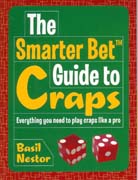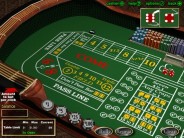
Smarter Bet Guide to Craps
by Basil Nestor
Some craps bets are good, some are not-so-good, and some are for suckers. The Smarter Bet Guide to Craps separates the best from the rest, and makes craps easy to learn. Everything is here in a clear-cut format: Table layout, dice-shooting techniques, a detailed analysis of every craps bet, and mathematically proven strategies that help lower the casino's advantage. A good basic guide to the game for players who are just starting out.
Play Craps at Club USA Casino!
You may not be able to finesse your toss, but you can play dice at Club USA Casino. The site features a realistic table, plenty of betting options and good pass line odds.
History of Craps
by Basil Nestor
Craps is by far the most exciting and fast-moving of all the casino table games. It’s a communal experience. You and a bunch of other people toss a pair of dice and bet on the results. Players Basil Nestor is the author of the new Playboy Complete Guide to Casino Gambling. This wonderful book teaches players how to avoid sucker bets and win more when playing gambling games. He is also the author of The Smarter Bet Guide series for video poker, slots, craps, and many other books about gambling. Basil's website is www.smarterbet.com win and lose en masse. If the dice are hot, everyone is shouting. Craps is the sort of contest that appeals to gregarious gamblers and those who love fast action and mercurial ups and downs. Indeed, it’s a contest that has bewitched players for centuries.
Basil Nestor is the author of the new Playboy Complete Guide to Casino Gambling. This wonderful book teaches players how to avoid sucker bets and win more when playing gambling games. He is also the author of The Smarter Bet Guide series for video poker, slots, craps, and many other books about gambling. Basil's website is www.smarterbet.com win and lose en masse. If the dice are hot, everyone is shouting. Craps is the sort of contest that appeals to gregarious gamblers and those who love fast action and mercurial ups and downs. Indeed, it’s a contest that has bewitched players for centuries.
 Basil Nestor is the author of the new Playboy Complete Guide to Casino Gambling. This wonderful book teaches players how to avoid sucker bets and win more when playing gambling games. He is also the author of The Smarter Bet Guide series for video poker, slots, craps, and many other books about gambling. Basil's website is www.smarterbet.com win and lose en masse. If the dice are hot, everyone is shouting. Craps is the sort of contest that appeals to gregarious gamblers and those who love fast action and mercurial ups and downs. Indeed, it’s a contest that has bewitched players for centuries.
Basil Nestor is the author of the new Playboy Complete Guide to Casino Gambling. This wonderful book teaches players how to avoid sucker bets and win more when playing gambling games. He is also the author of The Smarter Bet Guide series for video poker, slots, craps, and many other books about gambling. Basil's website is www.smarterbet.com win and lose en masse. If the dice are hot, everyone is shouting. Craps is the sort of contest that appeals to gregarious gamblers and those who love fast action and mercurial ups and downs. Indeed, it’s a contest that has bewitched players for centuries.The origin of craps is quite remarkable. The game of hazard (the forerunner of craps) was developed in Palestine way back in the time of the Crusades, around 1100. In fact, the English word “hazard” comes from the Arabic phrase for dice, “al-zahr.” Clearly, medieval players thought the contest was dangerous, even though they loved playing it.
Crusaders brought the game back to Europe, and it flourished as the centuries passed, all the while maintaining its volatile reputation.
Geoffrey Chaucer wrote about hazard in his Canterbury Tales around the year 1390. One of Chaucer’s characters is a kind of priest called a pardoner. The pardoner describes hazard as the “mother of leasings (lies), and of deceit, and cursed forswearings.” He includes the following gambler’s oath: “Seven is my chance, and thine is cinque and trey. By Godde’s armes, if thou falsely play, this dagger shall throughout thine hearte go.”
Ouch!
Violence aside, Europeans were hooked on the contest. Charles Cotton, an English author, wrote in 1674, “Certainly Hazzard is the most bewitching game that is played on the Dice; for when a man begins to play he knows not when to leave off; and having once accustomed himself to play at Hazzard he hardly ever after minds anything else.”
French sailors brought hazard to the New World via New Orleans some time after 1718. By that point, the contest had morphed into a variation called crabs (which was the nickname for a roll of two). When the French said “crabs” it sounded like “craps” to the Americans, and the name stuck.
French sailors shouted “Crabs!” while playing hazard on the wharves of New Orleans in the early nineteenth century, and the Americans heard “Craps!” Thus craps became the name of the world’s most famous dice game. Coincidentally, the English lexicon already had a similar-sounding word, “crap,” meaning garbage or excrement. Then along came Thomas Crapper and his patented toilets. The resulting linguistic confusion has caused problems for polite society ever since. But rest assured, craps comes from the word crabs.
Hazard is still around (mostly played in Europe), but these days craps is the definitive dice game. In the last two centuries it has contributed many ubiquitous phrases to the English language. Examples include “no dice,” “on a roll,” “crapshoot,” and “crap out” to name just a few.
Best of all, even after 1,000 years, the contests has retained its mercurial nature. That’s good news for you because the contest wasn’t invented for casinos. The house edge was grafted onto the game in the modern casino era. So if you study craps strategies and play well, you have a good chance to win.
The preceding material is just a sample of what you'll find in Basil Nestor's Smarter Bet Guide to Craps.
[ learn more craps! ]

